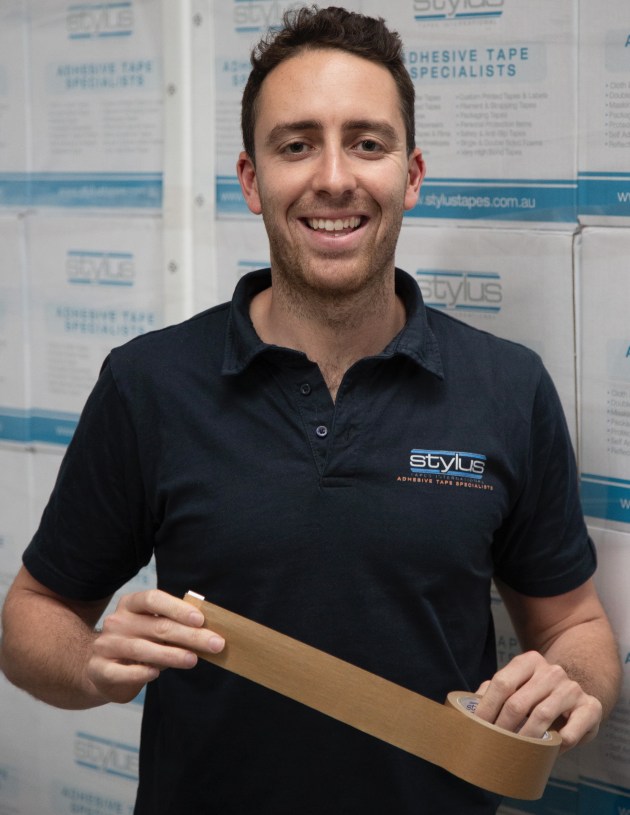With sustainability a central concern in the packaging industry, businesses are making changes across all areas. PKN speaks to Ben Grossberg, marketing manager at Stylus Tapes, about why eco-friendly packaging tapes are gaining traction.

Australian business Stylus Tapes’ commitment to sustainability is driven by market trends and corporate responsibility.
“Consumers and business expectations on packaging waste are changing, and we’ve noticed a significant shift towards paperisation, the move from plastic to fibre-based packaging,” says Grossberg.
The company recognised early on that aligning with the 2025 National Packaging Targets set by the Australian Packaging Covenant Organisation (APCO) would be crucial for staying relevant. Grossberg adds, “We believe it’s only a matter of time before the use of sustainable materials for packaging tape becomes a legislative requirement.”
The motivation also stems from a broader ethical standpoint. “As a third-generation family-owned business, we feel compelled to minimise environmental impact for future generations,” Grossberg notes.
RANGE AND APPLICATIONS
The eco-friendly tapes in the Stylus portfolio fall into three categories: compostable tape, recyclable paper tape, and tape made from recycled content. Stylus stocks a wide range of tapes across these categories.
“We’re extremely lucky to have close relationships with the top adhesive tape manufacturers around the world, so we have access to the leading edge of new tapes,” Grossberg says.
“The eco-friendly tapes in our range offer significant environmental advantages over traditional polypropylene tapes, which are made from virgin plastic and take years to break down in landfills,” he adds.
Compostable tapes, made from plant-based films, biodegrade under the right conditions. They can be used for sealing cartons, compostable bags, films, and bundling items such as flowers and garden waste. Grossberg cautions, however, that “biodegradable tape alone is not sufficient; it must be compostable to truly benefit the environment”.
Recyclable paper tapes can be recycled along with cardboard cartons. Many are FSC-certified, ensuring the materials are sourced from responsibly managed plantations. In this category, Stylus supplies Kraft paper tapes, with reinforced options for heavy-duty packaging. Water-activated tape (WAT) is another option, which doesn’t stick until activated by water. It provides a tamper-evident seal and can be more affordable than other eco-friendly tapes.
Tapes made from recycled content, such as post-consumer recycled (PCR) materials, reduce reliance on virgin plastic. Grossberg highlights that Stylus’ PCR tape is made from rPET, a material more viably recyclable than others, with potential for future domestic recycling.
“We don’t know which of these tape types will be the winner, so we’ll let the industry decide, and it might be different in each state,” Grossberg says. Some states, like South Australia, have a more developed composting infrastructure, so demand for compostable tape may be higher there.
Grossberg adds, “Packaging will be the first industry to change, so we’ve focused our efforts here. But we’re also introducing eco-friendly tapes to other industries, like PVC-free duct tape for construction and nano tape, a reusable double-sided tape for the DIY market.”
Performance and Cost
While eco-friendly tapes can match the performance of conventional adhesive tapes, Grossberg notes that they currently come at a higher cost. However, as demand increases and economies of scale improve, prices are expected to become more competitive.
When selecting the right eco-friendly tape, he says, businesses should consider factors such as surface type, carton quality, weight, storage conditions, and transportation requirements. The adhesive type also plays a significant role in performance, with natural rubber being the most versatile and recyclable option. Finally, businesses must consider the end-of-life disposal of the tape. For instance, if clear tape is needed, compostable or PCR PET tapes are recommended, while paper tapes are available in brown or white for a different aesthetic.
As the packaging industry evolves towards sustainability, eco-friendly packaging tapes offer businesses a way to reduce their environmental impact while meeting consumer expectations. By understanding the different types and applications, businesses can make informed choices that align with their sustainability goals.
This article was first published in the September-October 2024 print issue of Packaging News, p30.





